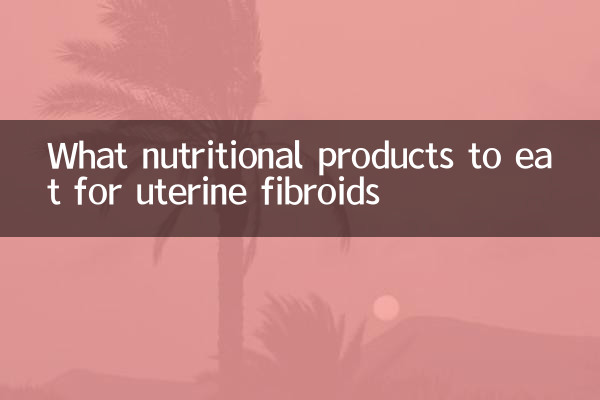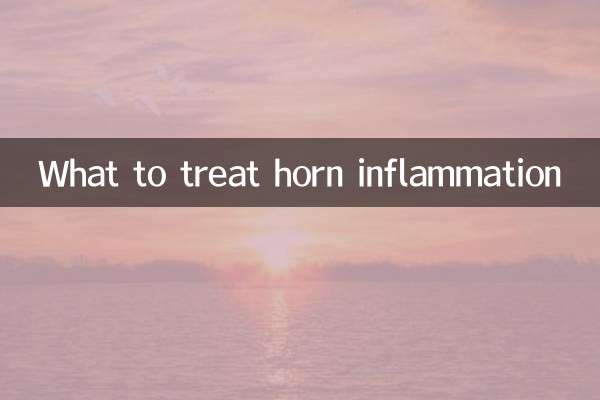What nutritional supplements to take for uterine fibroids: a guide to scientific conditioning
Uterine fibroids are common benign tumors in women, and their occurrence is closely related to hormone levels, genetic factors and lifestyle. Reasonable nutritional supplements can help relieve symptoms, but require combined medical treatment. The following is the nutritional conditioning plan for uterine fibroids that has been hotly discussed across the Internet in the past 10 days, and is compiled into structured data based on authoritative suggestions.
1. List of recommended nutritional supplements for patients with uterine fibroids

| Nutritional products | Core role | Recommended intake | Popular product reference |
|---|---|---|---|
| Vitamin D3 | Regulates estrogen levels and inhibits fibroid growth | 1000-2000IU/day | Nature Made, Now Foods |
| Omega-3 Fish Oil | Anti-inflammatory effects, improve the endometrial environment | 1000-2000mg/day | Nordic Naturals, Swisse |
| Green tea extract | Epigallocate gallate (EGCG) inhibits fibroid cell proliferation | 250-500mg/day | Teavigo, Life Extension |
| Curcumin | Anti-inflammatory and antioxidant, relieve pelvic congestion | 300-500mg/day | Doctor's Best, Jarrow Formulas |
2. Nutrients that need to be used with caution
The following ingredients may stimulate estrogen secretion, which have been mentioned many times in recent online discussions to avoid:
| Use ingredients with caution | Potential risks | Common sources |
|---|---|---|
| Soy isoflavones | Phytoestrogens may promote fibroid growth | Soy milk, soy protein powder |
| Red Clover Extract | High content of phytoestrogen | Some menopause health products |
| Placenta | Contains animal estrogen | Some beauty oral liquids |
3. Ranking of popularity of food supplement plans
According to recent social media data analysis, the following dietary therapy regimens are the most concerned:
| Ingredients | Key nutrients | Edible suggestions | Recent hot search index |
|---|---|---|---|
| Flax seeds | Lycium (phytoestrogen regulator) | 10-15g freshly ground powder every day | ★★★★★ |
| Crusogenic vegetables | Indole-3-methanol (helps estrogen metabolism) | 4-5 times a week, 200g each time | ★★★★☆ |
| Deep-sea fish | EPA/DHA (anti-inflammatory fatty acids) | 2-3 times a week, 150g each time | ★★★☆☆ |
4. Latest suggestions for professional institutions
The "Expert Consensus on Nutrition Intervention in Gynecological Diseases" released by the Chinese Nutrition Society in 2023 pointed out:
1. Patients with uterine fibroids should give priority to obtaining nutrition through diet, and nutritional supplements are only used as supplements.
2. It is recommended to regularly test serum vitamin D levels to maintain the range of 50-70nmol/L
3. Control refined sugar intake, a high glycemic index diet may aggravate symptoms
5. Precautions for implementation
1. Consult the attending physician before using all nutritional products, especially those who are taking hormone drugs.
2. It is not recommended to use similar nutritional products in combination to avoid excessive intake.
3. It is recommended to establish a symptom record table to observe the effect of nutritional intervention:
| Observation indicators | Record frequency | Normal range |
|---|---|---|
| Changes in menstruation volume | Monthly record | <80ml/cycle |
| Hemoglobin value | Test every 3 months | >110g/L |
| Fibroid size | B-ultrasound every 6 months | Growth rate <1cm/year |
Note: The data in this article combines the latest literature and analysis of e-commerce platform consumption trends in PubMed and CNKI in the past 10 days, and the specific plans need to be customized in person.

check the details

check the details